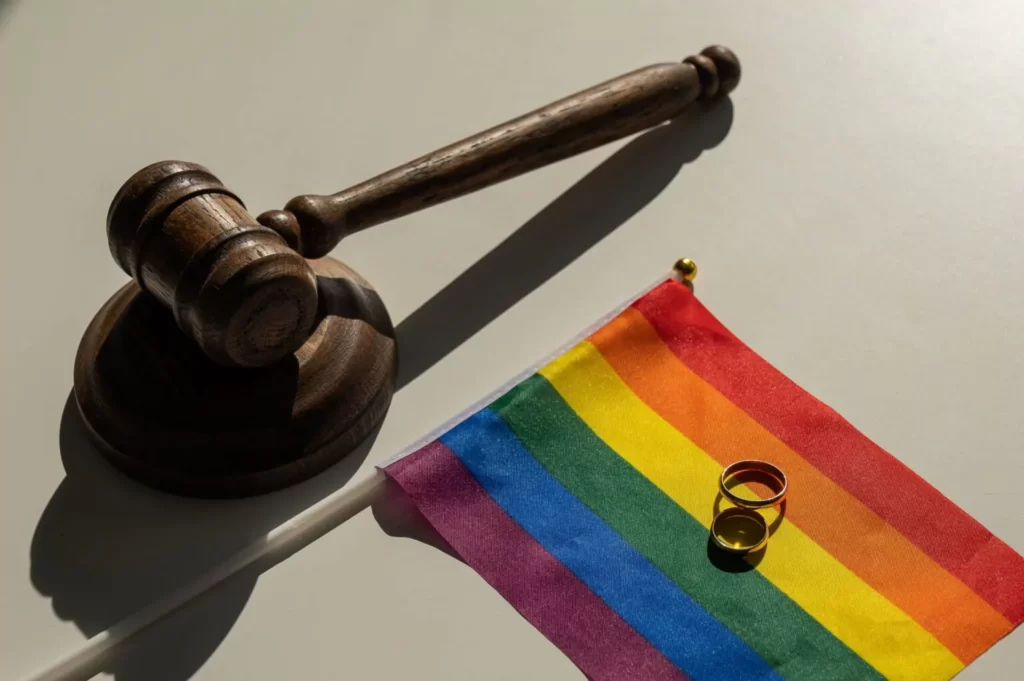LGBTQ Divorce:- In 2015, the United States Supreme Court made a groundbreaking decision in Obergefell v. Hodges, legalizing same-sex marriage across the nation. This landmark ruling marked a significant step forward in the fight for LGBTQ+ rights, granting same-sex couples access to the same legal benefits and protections afforded to their heterosexual counterparts.
However, while same-sex couples celebrated their newfound right to marry, the reality of divorce was often overlooked. In this article, we will explore the complexities and challenges faced by same-sex couples when navigating divorce in the United States.
Divorce Basics: Filing Requirements
The process of divorce for same-sex couples largely mirrors that of heterosexual couples. The key consideration is meeting your state’s residency requirements. If you were married in a state where same-sex marriage was legal before the nationwide ruling, you must still fulfill the residency requirements of the state where you currently reside.
In some cases, if you are living in a country that does not recognize same-sex marriage, some states may allow you to file for divorce in their courts. Furthermore, it is important to understand the concept of “no-fault” divorce, which many states offer.
This means that you do not need to provide reasons for the divorce other than the mutual desire to end the marriage. While some states also allow for fault-based divorce, it often results in lengthy and acrimonious legal battles, making the no-fault option more practical for most couples.
Custody and Child Support Issues in Gay and Lesbian Divorce
Unfortunately, discriminatory parentage laws still exist in many states, utilizing gendered language that may not reflect the reality of same-sex relationships. However, the Supreme Court decision in Pavan v. Smith extended the Obergefell ruling to cover benefits of marriage, including parentage. This means that adoption by married same-sex couples is legal in all U.S. states.
Moreover, the “paternity presumption” in state laws, historically applied to husbands in heterosexual marriages, has increasingly been extended to wives in same-sex marriages.
This legal shift ensures that non-biological mothers have parental rights, thereby protecting the best interests of the child. Several court cases have upheld these principles and affirmed the parental rights of non-biological parents in same-sex marriages.
Property Division in Gay Divorces
The division of marital property and debts in same-sex divorces generally follows the same principles applied in heterosexual divorces. Marital property encompasses assets acquired during the marriage.
However, this can pose challenges for couples who cohabited and shared their lives before same-sex marriage was legally recognized. Property acquired individually before marriage may be considered separate property and awarded solely to one spouse.
Nevertheless, judges often have the discretion to ensure a fair division of property, considering the specific circumstances of the case. Therefore, the equitable distribution of assets is possible, even if the assets were acquired before the legal marriage.
Spousal Support Issues in Same-Sex Divorces
Alimony, or spousal support, in same-sex divorces follows similar rules as in heterosexual divorces. The duration and amount of alimony payments depend on the length of the marriage, the financial need of one spouse, and the other spouse’s ability to pay. However, the challenge arises when couples have had lengthy relationships before legal marriage.
Judges may differ in their approach, either considering the years of premarital cohabitation or solely focusing on the legal marriage.
In some states like California, “palimony” may be awarded, allowing for financial support to unmarried partners based on their cohabitation history. However, this varies from state to state, and legal guidance is essential when assessing eligibility for alimony or palimony.
Settlement Agreements
To avoid the uncertainty of court rulings and reduce divorce costs, couples are encouraged to reach a marital settlement agreement. These agreements allow couples to decide on child custody, support, property division, and alimony themselves, tailored to their unique circumstances. Mediation can also be a helpful tool to facilitate agreement and ensure a smoother divorce process.
Ending Domestic Partnerships
Before same-sex marriage became legal, many couples registered as domestic partners or entered civil unions. Terminating these partnerships can be more complicated and is subject to the laws of the specific state or municipality.
Some partnerships may automatically dissolve upon marriage, while others may require separate legal processes.
Ending a state domestic partnership alongside a divorce may vary depending on residency requirements and state-specific laws. Consultation with a local family law attorney specializing in LGBTQ+ issues is often necessary to navigate this complex terrain.
Conclusion (LGBTQ Divorce)
The legalization of same-sex marriage in 2015 was a significant step forward in the fight for LGBTQ+ rights, affording equal legal recognition to same-sex couples. However, as this article has highlighted, navigating same-sex divorce presents its own set of challenges and complexities.
Understanding the legal requirements and seeking the guidance of legal professionals experienced in LGBTQ+ issues is crucial for couples looking to dissolve their marriages amicably and fairly.
While the legal landscape may be evolving, one thing remains constant: access to legal counsel and knowledge is vital for a smoother journey through the divorce process for same-sex couples.
